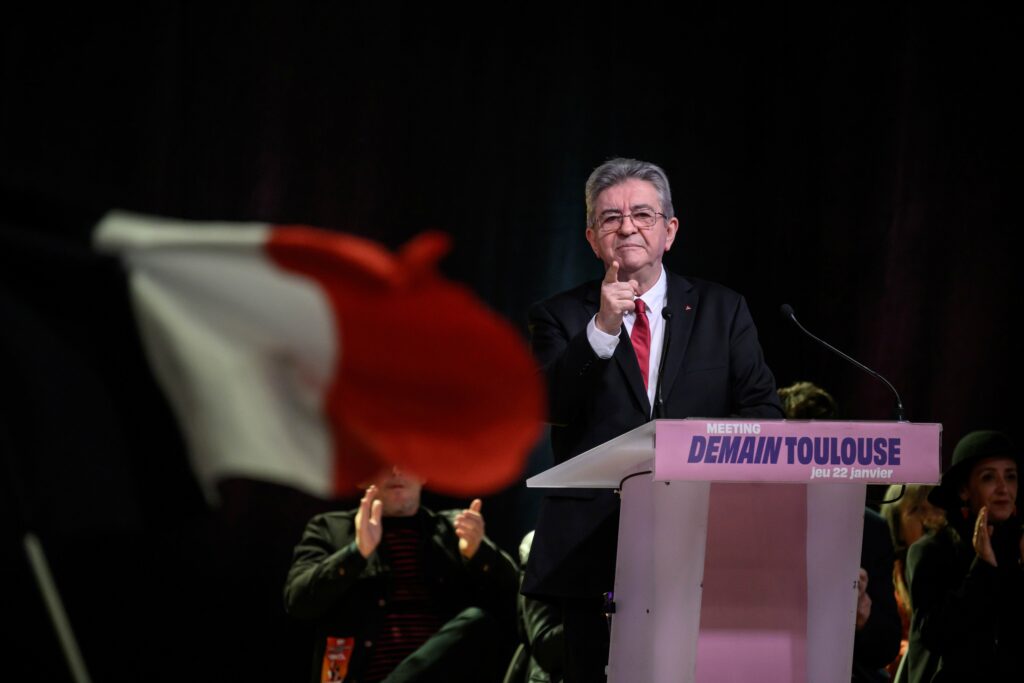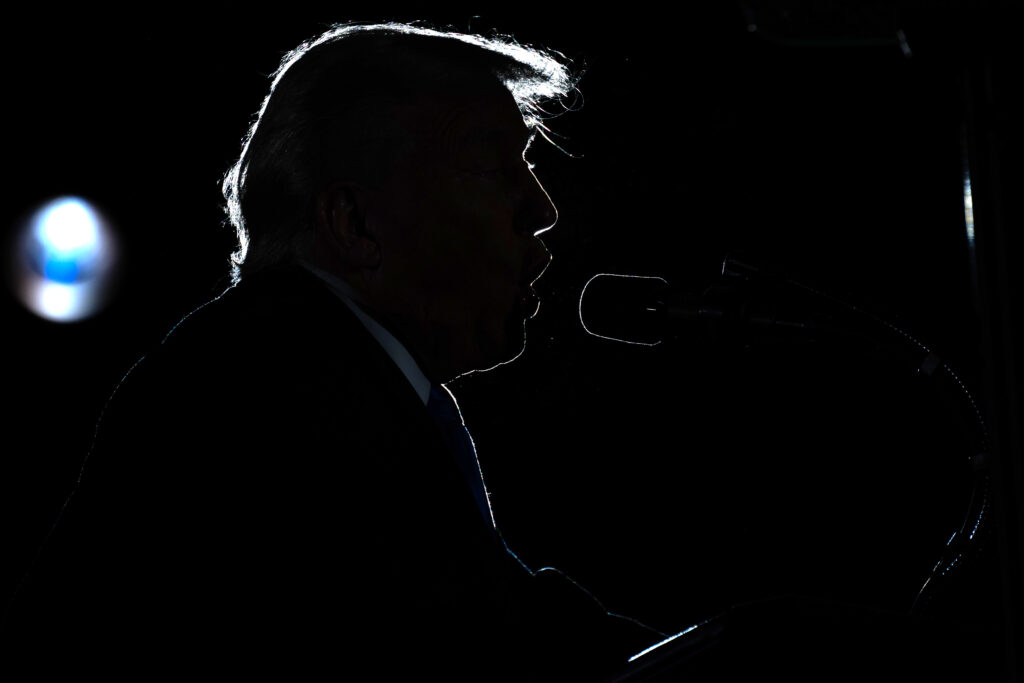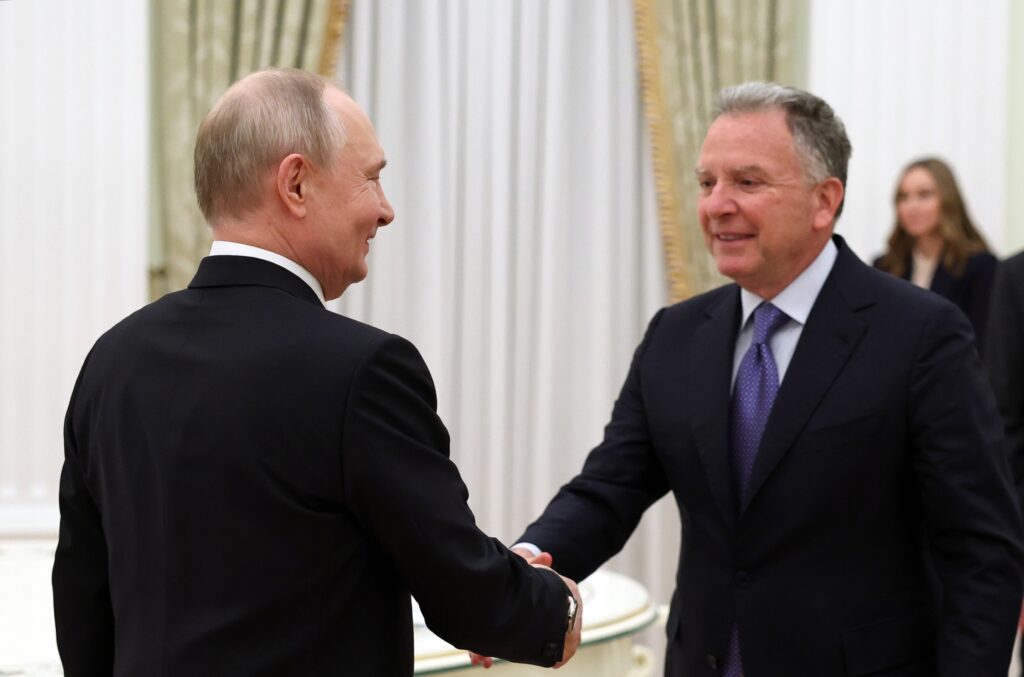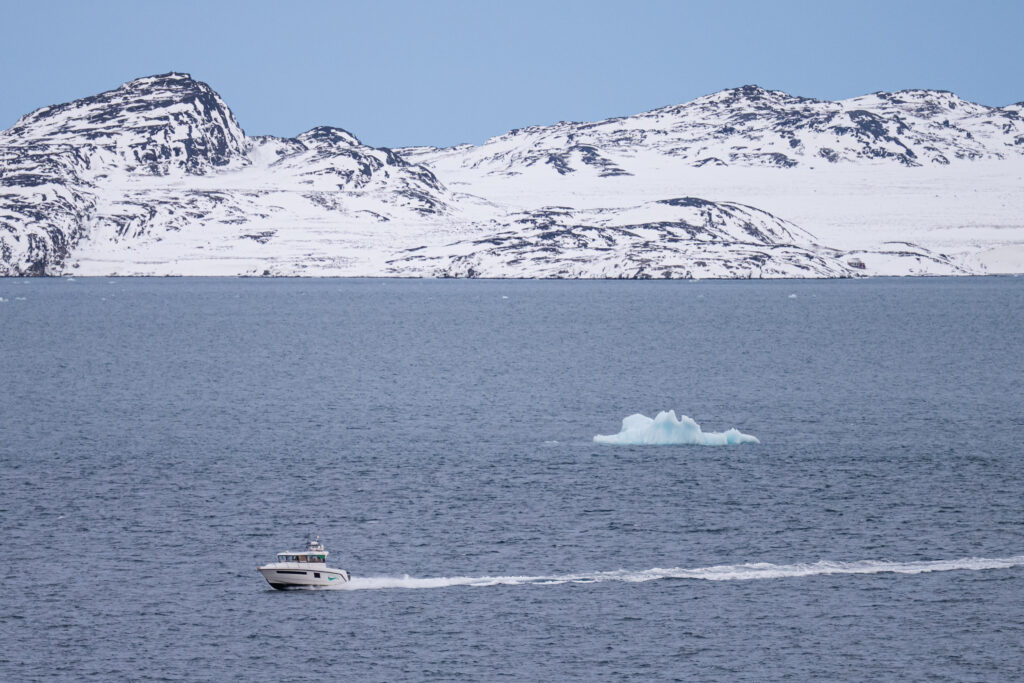Mélenchon: aux municipales, LFI doit incarner “la nouvelle France” de la diversité
Le leader de La France insoumise, Jean-Luc Mélenchon, a estimé jeudi à Toulouse que son parti devait démontrer aux prochaines élections municipales “sa capacité à incarner la nouvelle France, celle du grand remplacement”, lors d’un meeting de soutien au candidat local LFI, François Piquemal.”Nous avons besoin d’élections municipales qui puissent être une démonstration du niveau de conscience politique du peuple français dans sa diversité, de la capacité de nos listes à incarner la nouvelle France, celle du grand remplacement, celle de la génération qui remplace l’autre parce que c’est comme ça depuis la nuit des temps”, a lancé M. Mélenchon, devant une salle de “plus de 1.500 personnes”, selon les organisateurs.”Ce n’est pas parce qu’il y a dix dingues dans un coin qui ont peur d’être remplacés par leurs enfants que nous devons partager leurs peurs”, a-t-il ajouté, devant une assistance où flottaient des drapeaux français, de LFI, du NPA ou de la Palestine.Dans un discours de plus d’une heure jalonné de références historiques et de nombreux commentaires sur la situation internationale, le leader de LFI a estimé que la bataille des municipales était liée à celle de la présidentielle car “nous allons faire localement des choses dont on voudra donner le goût pour tout le pays”.M. Mélenchon a par ailleurs ironisé sur les listes concurrentes de gauche qui n’ont qu’une “chose à dire, la même — ils ne sont même pas originaux — d’une ville à l’autre: ils disent (à propos de LFI, ndlr) ils ne feront pas 10% et le pire qui leur arrive, c’est qu’ils croient à leur propre propagande”.”Ne rentrez pas la tête dans les épaules, ne regardez pas ailleurs, ce que nous faisons, c’est construire cette France dont non seulement les Français ont besoin mais dont le monde a besoin”, a lancé M. Mélenchon à ses partisans, souhaitant que la France soit “une puissance qui n’a peur de personne (…) et qui porte haut la voix pour dire: M. Trump, vous êtes un grossier plouc, vous ne nous faites pas peur”.Avant lui, François Piquemal, député LFI des quartiers populaires de l’ouest de Toulouse, qui se lance à 41 ans pour la première fois à l’assaut du Capitole, avait appelé à en finir “avec quatorze années de droite réactionnaire” dans la ville rose, incarnées selon lui par le maire sortant, Jean-Luc Moudenc (DVD).
Collision ferroviaire en Espagne: le bilan monte à 45 morts
Deux nouveaux corps, les deux derniers, ont été retrouvés jeudi dans l’un des deux trains impliqués dans la collision de dimanche soir en Andalousie (sud), portant le bilan définitif de cette catastrophe à 45 morts.Les médecins légistes “ont pratiqué l’autopsie de 45 personnes, toutes décédées dans l’accident”, a indiqué le soir l’organisme en charge du décompte dans un communiqué, confirmant l’identification des deux derniers corps récupérés.Le chef du service d’enquête de la Garde civile, Fernando Domínguez, avait prévenu dans l’après-midi qu’il serait mis “fin au dispositif de recherche” dès l’identification des deux derniers corps.Au total, 45 signalements pour disparition ont été émis par des proches de passagers auprès de la police.Ces deux derniers corps ont été retrouvés dans une des voitures du train de la Renfe (la compagnie ferroviaire publique), percuté de plein fouet par trois voitures d’un train de l’opérateur Iryo – une société détenue majoritairement par le groupe italien Trenitalia – qui avaient déraillé et s’étaient déportées sur sa voie.Depuis plusieurs jours, des engins de chantier s’activaient à Adamuz pour dégager et découper la ferraille afin de retrouver les corps encastrés dans les rames de train qui circulaient à plus de 200 km/heure au moment de la collision.Selon le dernier bilan détaillé transmis mercredi par l’Institut médico-légal (qui ne prenait donc pas en compte les derniers corps retrouvés), 28 dépouilles se trouvaient dans le train de la Renfe, six sur les voies, six autres dans le train Iryo et trois “entre les deux trains”.Quant aux signalements pour disparition, il y avait 22 femmes et 23 hommes. Il s’agissait pour la plupart d’Espagnols, sauf trois d’entre eux qui étaient allemand, marocain et russe.- Une enquête “complexe” -La tâche la plus urgente des autorités est maintenant de déterminer les causes de cette tragédie, qui restent à cette heure mystérieuses.D’après les médias espagnols, l’enquête – qui exclut l’hypothèse d’un acte de sabotage, selon le gouvernement – s’intéresse à une rupture du rail de plus de 30 centimètres de long à l’endroit de l’accident.Mercredi, des journaux ont également évoqué la piste d’un “bogie” (chariot placé dans la partie inférieure du châssis d’un train) retrouvé dans un cours d’eau proche du lieu de la collision.Le ministre des Transports, Óscar Puente, avait expliqué mercredi soir qu’il s’agissait d’une “enquête complexe qui demande du temps, une analyse approfondie et un examen exhaustif de tous les acteurs impliqués”, à savoir “l’infrastructure, le matériel roulant, les systèmes de sécurité et les conditions d’exploitation”.Il avait surtout défendu avec force le réseau ferroviaire et les transports publics du pays, dont l’image a terriblement souffert de cette semaine noire, également marquée mardi soir par un autre accident qui a fait un mort et 37 blessés à Gelida, en Catalogne (nord-est), lorsqu’un train de banlieue a percuté un mur de soutènement tombé sur les voies en raison de fortes pluies. Depuis, tout le réseau de trains de banlieue de la Catalogne est à l’arrêt, handicapant ses 400.000 voyageurs quotidiens.- “Point d’inflexion” -Jeudi, c’est un train de banlieue qui a été heurté par un camion-grue d’éclairage public près de Carthagène (sud est), faisant quelques blessés légers et confirmant cette loi des séries.Confronté à deux accidents ferroviaires mortels en 48 heures, le gouvernement de gauche de Pedro Sánchez, et surtout son ministre des Transports, sont sous pression à la fois de l’opposition de droite et du syndicat des conducteurs de train, le Semaf.Décrivant les accidents d’Adamuz et Gelida comme “un point d’inflexion”, ce syndicat a convoqué mercredi une grève de trois jours les 9, 10 et 11 février “pour que se soient réalisées toutes les réformes garantissant la sécurité des opérations ferroviaires”.Il dénonce notamment que “les nombreux rapports” remis par les conducteurs sur “le mauvais état des voies” dans certains endroits précis du réseau soient restés “sans “réponse ni intervention pendant des mois, voire des années”.
White House X account alters protester photo to add tears
The White House’s X account on Thursday posted a doctored photo of a protester arrested in Minnesota, showing her face contorted with tears without disclosing that the photorealistic image had been altered.The edited photo of Nekima Levy Armstrong — among three people arrested for allegedly disturbing a church service while protesting an immigration crackdown — illustrates how President Donald Trump’s administration is increasingly using deepfakes or AI imagery to make political arguments.On Thursday morning, Secretary of Homeland Security Kristi Noem posted an image on X showing Armstrong’s arrest, her face calm and expressionless.About 30 minutes later, the White House posted the same image on the platform, but altered to show Armstrong sobbing, her mouth open, forehead wrinkled, and tears streaming down her face.A caption superimposed on the image read “ARRESTED,” labeling Armstrong a “far-left agitator.”The White House post offered no disclaimer that the image had been edited, and it was not immediately clear whether the alteration was done using an AI tool or other photo editing software.When reached for comment, the White House redirected AFP to a post on X by White House Deputy Communications Director Kaelan Dorr, who tacitly acknowledged that the image had been modified.”YET AGAIN to the people who feel the need to reflexively defend perpetrators of heinous crimes in our country I share with you this message,” Dorr wrote on X, resharing the White House post featuring Armstrong’s altered photo.”Enforcement of the law will continue. The memes will continue. Thank you for your attention to this matter.”Underneath the White House post, several users questioned why the image had been altered to make Armstrong appear to be crying.”We should be disturbed by any party using AI to manipulate photographs and presenting them as fact, which appears to be the case here,” one user wrote. “This point of view should have bipartisan agreement.”- ‘Lack of decorum’ -In the age of deepfakes and AI, such edited images are now “commonplace in partisan politics,” said Walter Scheirer of the University of Notre Dame.”They are frequently used to humiliate opposition figures or make exaggerated political statements that resonate with a political base,” Scheirer told AFP.”One could consider this the contemporary version of newspaper political cartoons, but there is a notable lack of decorum when it comes through official government communication channels.”During the first year of his second White House term, Trump ramped up his use of hyper-realistic but fabricated visuals on Truth Social and other platforms, often glorifying himself while lampooning his critics.Trump or the White House have similarly shared AI-made images depicting the president dressed as the pope, roaring alongside a lion, and conducting an orchestra at the Kennedy Center — Washington’s premier arts complex — where he installed himself as chair of the board.Underscoring the strategy’s potential appeal to younger voters, similar AI-driven messaging has also been adopted by other arms of the Trump administration as well as by some of the president’s political rivals.
Ukraine: l’émissaire américain Witkoff s’entretient avec Poutine à Moscou
L’émissaire américain Steve Witkoff a rencontré jeudi le président russe Vladimir Poutine à Moscou dans le cadre des pourparlers sur la fin de la guerre en Ukraine, peu après une courte entrevue entre Volodymyr Zelensky et Donald Trump en Suisse.A l’issue de ce dernier entretien en marge du Forum économique de Davos, le dirigeant ukrainien a affirmé avoir obtenu de son homologue américain un accord sur les garanties de sécurité promises par Washington à l’Ukraine.Il a également annoncé des discussions “trilatérales” entre l’Ukraine, les Etats-Unis et la Russie cette semaine aux Emirats arabes unis, sans toutefois en préciser les modalités ni le format exact.Dans ce contexte d’agitation diplomatique, Steve Witkoff, qui est accompagné par le gendre du président américain, Jared Kushner, a atterri dans la soirée à Moscou et s’est rendu dans la foulée au Kremlin.La présidence russe a annoncé le début de la rencontre peu après.M. Witkoff s’est déjà entretenu à plusieurs reprises avec le président russe depuis un an, dans le cadre des efforts américains pour mettre fin à quatre ans de combats en Ukraine. Il doit aller ensuite aux Emirats arabes unis.Depuis Davos, M. Witkoff avait vanté les progrès “significatifs” accomplis lors de sa rencontre, le week-end dernier à Miami, avec les négociateurs ukrainiens. “Je pense que nous avons réduit le problème à un seul point”, a-t-il déclaré.- “Pas simple” -Le président ukrainien Volodymyr Zelensky était de son côté jeudi à Davos, où il s’est brièvement entretenu avec Donald Trump, évoquant ensuite devant les journalistes une rencontre “positive” mais un dialogue “pas simple”.Il a plus tard assuré être parvenu à un accord sur les garanties de sécurité qui doivent être offertes par les Etats-Unis à l’Ukraine pour dissuader la Russie d’attaquer à nouveau après une éventuelle fin du conflit.”Les garanties de sécurité, c’est prêt”, a-t-il déclaré, indiquant que “le document doit être signé par les parties, par les présidents, et ensuite il ira aux parlements nationaux”.M. Zelensky a en revanche indiqué que l’épineuse question des territoires de l’est de l’Ukraine revendiqués par Moscou n’est “pas encore résolue”.”La guerre doit prendre fin”, a de son côté indiqué Donald Trump après leur rencontre, à des journalistes qui l’interrogeaient sur le message qu’il voulait faire passer au chef de l’Etat russe Vladimir Poutine.M. Trump avait précédemment imputé le blocage dans les négociations à M. Zelensky, alors que les alliés européens de Kiev craignent que Washington ne fasse pression pour un accord jugé trop favorable à Moscou.- Zelensky tance les Européens -Volodymyr Zelensky a par ailleurs évoqué de prochaines discussions “trilatérales” entre l’Ukraine, les Etats-Unis et la Russie, qui doivent se tenir cette semaine aux Emirats arabes unis.Des négociations directes entre la Russie et l’Ukraine avaient déjà eu lieu lors de la première année de la guerre, en 2022, et à plusieurs reprises en 2025, à Istanbul. Ces pourparlers n’avaient abouti qu’à des échanges de prisonniers et de dépouilles de soldats sans règler le conflit.Vladimir Poutine, dont les principales demandes sont un retrait des troupes ukrainiennes du Donbass, dans l’est industriel de l’Ukraine, et un engagement de Kiev de non-adhésion à l’Otan, avait averti que Moscou atteindrait ses objectifs par la voie militaire si la diplomatie échouait.L’armée russe a multiplié ces derniers mois les frappes massives sur le réseau énergétique ukrainien, provoquant des coupures d’électricité et de chauffage d’ampleur notamment dans la capitale, alors que les températures sont glaciales.De plus en plus critique des Européens ces dernières semaines, M. Zelensky a prononcé un discours particulièrement dur à Davos jeudi envers ses principaux soutiens, disant voir une Europe “fragmentée” et “perdue” lorsqu’il s’agit d’influer sur les positions de Donald Trump et manquant de “volonté politique” face à Vladimir Poutine.”Au lieu de devenir une vraie puissance mondiale, l’Europe reste un kaléidoscope beau mais fragmenté de petites et moyennes puissances”, a-t-il déploré, évoquant des “querelles internes incessantes et des non-dits” qui “empêchent l’Europe de s’unir”.Il a également jugé, malgré les promesses européennes de déploiement de troupes en Ukraine après la guerre, “qu’aucune garantie de sécurité ne peut fonctionner sans les Etats-Unis” et que le soutien de son homologue américain était “indispensable”.
US stocks rally again after Trump backs off Greenland tariff threat
Global stocks rallied Thursday, lifting US indices for a second straight day after President Donald Trump dialed back tariff threats on Europe over their opposition to a US takeover of Greenland.Wall Street indices, which jumped more than one percent Wednesday after Trump significantly softened his tone on Greenland, finished solidly higher again Thursday.The broad-based S&P 500 won 0.6 percent.After focusing on Greenland, Iran and other geopolitical hotspots, “it seems like there’s a lot of tailwinds back in the market,” said Tom O’Shea, from Innovator Capital Management. “The economy is in a really good position to move forward.” US data releases Thursday included a modest uptick in US third-quarter growth to 4.4 percent and a stable reading on inflation for November.Next week’s US earnings calendar is packed with results from Apple, Microsoft, Boeing and other corporate giants. There will also be a Federal Reserve monetary policy decision.Markets had been rattled this week by the US president saying he would hammer several nations — including Germany, France, Britain and Denmark — with levies for their pushback against his grab for Greenland, a Danish autonomous territory.But relief came Wednesday when Trump backed down on threats to seize the Arctic island by force from ally Denmark and retracted his tariff threat.”That was enough to trigger the so-called TACO trade — ‘Trump Always Chickens Out’ — and markets responded with one of their strongest rallies in recent months,” said Fawad Razaqzada, market analyst at Forex.com.- Trade wars ‘biggest concern’ -But analysts said there was no guarantee that Europe-US relations had improved durably, a concern that capped gains.”The Greenland situation may have calmed down, but there are still enough unanswered questions,” said AJ Bell investment director Russ Mould. “It’s more about financial markets regaining balance than moving into top gear.”One lesson from this week’s price swings was that “financial markets fear tariffs more than geopolitical risks,” noted Kathleen Brooks, research director at XTB. “Trade wars are the biggest concern for markets.”Advances in Asian equities earlier were led by tech-heavy markets Tokyo, Taipei and Seoul, with the latter topping 5,000 points for the first time as chip companies enjoyed bumper gains.The surge came after Nvidia boss Jensen Huang told the World Economic Forum in Davos that the infrastructure to develop and power generative AI models will require further “trillions” of dollars in investment.He told delegates that the AI boom “has started the largest infrastructure buildout in human history”.The remarks helped boost South Korean chip leaders Samsung and SK hynix, tech investment giant SoftBank in Japan, and European heavyweights ASML and STMicroelectronics.French video game giant Ubisoft lost more than a third of its value in a single session, with its stock closing more than 39 percent lower, after the “Assassin’s Creed” maker announced it expected to make huge losses this year and needed to restructure drastically.- Key figures at around 2110 GMT -New York – Dow: UP 0.6 percent at 49,384.01 (close)New York – S&P 500: UP 0.6 percent at 6,913.35 (close)New York – NASDAQ: UP 0.9 percent at 23,436.02 (close)London – FTSE 100: UP 0.1 percent at 10,150.05 (close)Paris – CAC 40: UP 1.0 percent at 8,148.89 (close)Frankfurt – DAX: UP 1.2 percent at 24,856.47 (close)Tokyo – Nikkei 225: UP 1.7 percent at 53,688.89 (close)Hong Kong – Hang Seng Index: UP 0.2 percent at 26,629.96 (close)Shanghai – Composite: UP 0.1 percent at 4,122.58 (close)Euro/dollar: UP at $1.1751 from $1.1685 on WednesdayPound/dollar: UP at $1.3500 from $1.3439Dollar/yen: UP at 158.39 yen from 158.30 yenEuro/pound: UP at 87.05 pence from 87.00 penceBrent North Sea Crude: DOWN 1.8 percent at $64.06 per barrelWest Texas Intermediate: DOWN 2.1 percent at $59.36 per barrelburs/jh/rlp/msp





